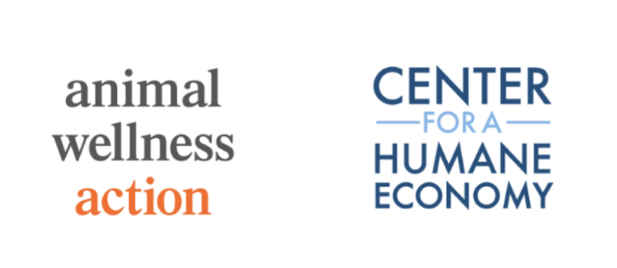
Reps. Nancy Mace, Dina Titus, and Sens. Mike Lee, Cory Booker, Rand Paul, Elizabeth Warren, and Kirsten Gillibrand Introduce Bicameral, Bipartisan Legislation Tuesday
WASHINGTON, D.C. – Today, Animal Wellness Action (AWA), the Organization for Competitive Markets (OCM), the Center for a Humane Economy (CHE), and the National Dairy Producers Organization (NDPO) applauded U.S. Reps. Nancy Mace, R-S.C., and Dina Titus, D-Nev., and U.S. Sens. Mike Lee, R-Utah, Cory Booker, D-N.J., Rand Paul, R-Ky., Elizabeth Warren, D-Mass., and Kirsten Gillibrand, D-N.Y., for introducing the bicameral, bipartisan, Opportunities for Fairness in Farming (OFF) Act.
The measure is designed to reform and bring accountability and transparency to reform the USDA’s Commodity Checkoff Programs that have long been plagued by scandal after scandal for misappropriation of funds, lack of transparency, and misusing farmer and rancher tax dollars and was first introduced in the 115th Congress. Proponents of the OFF Act argue that national livestock trade associations work against the best interests of rank-and-file family farmers and work to benefit the industrial agriculture and international processors.
“We applaud Reps. Mace and Titus as well as Sens. Lee, Booker, Paul, Warren, and Gillibrand for their tireless work and leadership on the Opportunities for Fairness in Farming Act,” said Marty Irby, executive director at Animal Wellness Action, and board secretary at the Organization for Competitive Markets. “USDA’s commodity checkoff programs remain under fire because of their lack of transparency, misuse of funds, and damaging anti-competitive practices that have bankrupted millions of American farmers.”
“Industrial agriculture is sucking up family farmers’ hard-earned dollars and using those funds against the interests of the very producers it was designed to represent,” said U.S. Rep. Nancy Mace, R-S.C. “The support for the OFF Act is overwhelming, with more than 80 farm organizations, representing over 250,000 family farmers and ranchers, cheering on the measure alongside groups like Animal Wellness Action and the Center for a Humane Economy. We hope to secure enactment of this legislation as a rider to the upcoming Farm Bill to save our American family farmers in peril.”
“American family farmers are in peril, and today, every cent counts,” said Taylor Haynes, president at the Organization for Competitive Markets. “If we’re going to be forced to pay into USDA’s checkoff programs then the very least we should expect is transparency, accountability, and oversight of our hard-earned dollars, and the OFF Act accomplishes just that.”
“Checkoff programs are filled with waste and often abuse those forced to contribute to their coffers. These common-sense reforms will ensure that checkoff funds promote and protect all ag producers (big and small) who are meant to be served by these programs,” said U.S. Sen. Mike Lee, R-Utah.
“The OFF Act was first introduced in the 115th Congress, and here we are in the 118th Congress still working for transparency and accountability to reform the USDA’s commodity checkoff programs,” said Deborah Mills, chairwoman of the National Dairy Producers Organization. “This speaks volumes about what frustrates producers who are paying into checkoff programs. The recipients of the checkoff dollars are the greatest proponents of maintaining the status quo. Producers are being denied the basic right to have their questions about their investment answered.”
“I don’t want my hard-earned dollars funneled to a quasi-governmental organization that works against my best interest and represents industrial agriculture’s continued movement toward the monopolization of farming,” said Will Harris, past president of the American Grassfed Association and proprietor of White Oak Pastures. “We’ve farmed the same land in Georgia since 1866, and I want to ensure that future generations are able to continue to do the same.”
“Farmers and Ranchers are being forced to pay into checkoff programs that often advocate against their best interest and support food system consolidation. These programs need transparency and oversight so a farmer can be sure they aren’t required to fund their own demise,” said U.S. Senator Cory Booker, D-N.J. “That is why I am proud to introduce this bipartisan legislation that will help increase transparency and prohibit conflicts of interest and anti-competitive practices in these programs.”
The text of the House bill can be found here and Senate companion can be found here. A link to Rep. Mace’s recorded video from the press conference today can be found here. The full press conference recording will be available this afternoon upon request.
Background:
The OFF Act would amend the authorizing checkoff laws to ensure the programs cannot contract with organizations that engage in lobbying, conflicts of interest, or anticompetitive activities that harm other commodities. It would also require that they publish all budgets and disbursements of funds for the purposes of public inspection and submit to periodic audits by the USDA Inspector General. The measure is supported by more than 250,000 farmers and ranchers across America in an unlikely coalition of allies that include OCM, Animal Wellness Action, NDPO, the American Grass-fed Association, the National Taxpayers Union, and the National Farmers Union to name a few.
Commodity checkoff programs (“checkoff programs”) were established to serve as mechanisms by which agricultural industries pool money for common commodity-specific promotional and research purposes. Fees are mandatory, from the smallest local farmer to the largest factory operation. Checkoff dollars go to federal, industry-specific boards, which are required by law to use these funds for mutually beneficial advertising campaigns and research.
Under federal law, farmers of certain commodities (including pork, eggs, beef, and corn) are required to pay a portion of their sales into checkoff programs. These mandatory fees are intended to be used by the U.S. government to research and market those commodities. Well-known examples of past checkoff-funded advertising campaigns are “Got Milk,” “Pork. The Other White Meat,” “The Incredible, Edible Egg,” and “Beef. It’s What’s for Dinner.” Checkoff programs collect over $850 million from America’s farmers and ranchers every year.
Despite the limited purpose of the checkoffs, checkoff programs have repeatedly acted beyond the scope of their statutory mandate. Lax oversight by the USDA has resulted in collusive and illegal relationships between checkoff boards and lobbying organizations, both of which have repeatedly used checkoff funds to influence legislation and government action despite a broad statutory prohibition. Such advocacy efforts have an anticompetitive effect and are forcing traditional family farmers to pay into a system that actively works against them.
The OFF Act was first introduced in the 115th Congress by Rep. Titus and former Rep. Dave Brat, R-Virg., in the U.S. House and Sens. Lee and Booker in the U.S. Senate and a 2018 Farm Bill amendment that mirrored the OFF Act was one of only three amendments afforded a vote in the U.S. Senate, but the measure was not included in the final farm bill signed into law.







